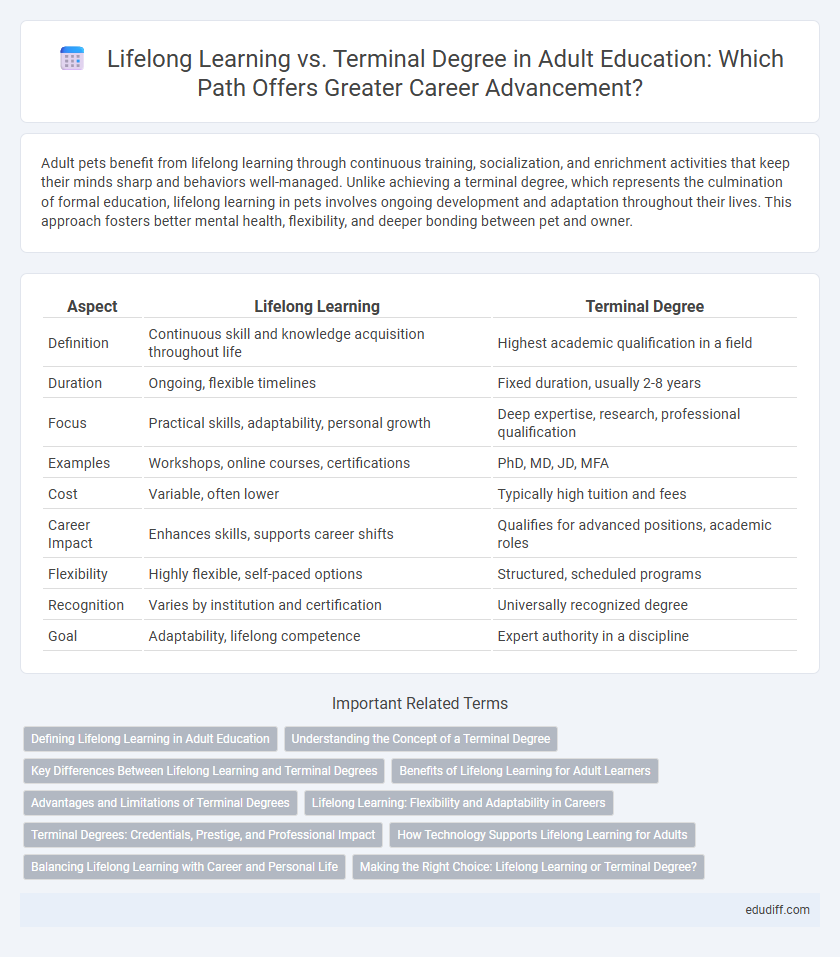Adult pets benefit from lifelong learning through continuous training, socialization, and enrichment activities that keep their minds sharp and behaviors well-managed. Unlike achieving a terminal degree, which represents the culmination of formal education, lifelong learning in pets involves ongoing development and adaptation throughout their lives. This approach fosters better mental health, flexibility, and deeper bonding between pet and owner.
Table of Comparison
| Aspect | Lifelong Learning | Terminal Degree |
|---|---|---|
| Definition | Continuous skill and knowledge acquisition throughout life | Highest academic qualification in a field |
| Duration | Ongoing, flexible timelines | Fixed duration, usually 2-8 years |
| Focus | Practical skills, adaptability, personal growth | Deep expertise, research, professional qualification |
| Examples | Workshops, online courses, certifications | PhD, MD, JD, MFA |
| Cost | Variable, often lower | Typically high tuition and fees |
| Career Impact | Enhances skills, supports career shifts | Qualifies for advanced positions, academic roles |
| Flexibility | Highly flexible, self-paced options | Structured, scheduled programs |
| Recognition | Varies by institution and certification | Universally recognized degree |
| Goal | Adaptability, lifelong competence | Expert authority in a discipline |
Defining Lifelong Learning in Adult Education
Lifelong learning in adult education emphasizes continuous skill development and knowledge acquisition beyond formal degrees, adapting to evolving personal and professional demands. Unlike terminal degrees, which represent the culmination of formal education, lifelong learning embraces ongoing, self-directed, and experiential learning processes. This approach fosters adaptability, critical thinking, and ongoing competence essential for career advancement and personal growth in dynamic environments.
Understanding the Concept of a Terminal Degree
A terminal degree represents the highest academic qualification attainable in a specific field, such as a PhD, EdD, or MFA, signifying mastery and expertise. Unlike lifelong learning, which emphasizes continuous skill development and knowledge acquisition throughout life, a terminal degree serves as a formal culmination of structured education. Understanding this distinction clarifies why professionals pursue terminal degrees for credentials while engaging in lifelong learning for ongoing growth and adaptability.
Key Differences Between Lifelong Learning and Terminal Degrees
Lifelong learning encompasses continuous, self-directed education that evolves with changing personal and professional needs, whereas terminal degrees represent the highest formal academic qualification achievable in a specific field, such as a PhD or JD. Lifelong learning prioritizes adaptability and practical skill acquisition beyond formal institutions, while terminal degrees emphasize comprehensive mastery and original research within a defined academic discipline. The key difference lies in the scope and purpose: lifelong learning fosters ongoing growth and versatility, while terminal degrees establish definitive expertise and credentials.
Benefits of Lifelong Learning for Adult Learners
Lifelong learning offers adult learners continuous skill enhancement, adaptability to evolving job markets, and personal growth beyond the static achievements of a terminal degree. By engaging in ongoing education, adults can stay current with technological advancements and industry trends, increasing their career resilience and opportunities for advancement. This approach fosters critical thinking, problem-solving abilities, and networking that contribute to sustained professional and personal development over time.
Advantages and Limitations of Terminal Degrees
Terminal degrees, such as PhDs or professional doctorates, provide advanced expertise and are often essential for academic and high-level professional roles, offering credibility and specialized knowledge. Limitations include reduced flexibility in adapting to new fields and the potential for overqualification in certain job markets, which may hinder broader career mobility. While lifelong learning fosters continuous skill development, terminal degrees represent a significant, finite educational achievement with specific career pathways.
Lifelong Learning: Flexibility and Adaptability in Careers
Lifelong learning fosters continuous skill development and adaptability, crucial for navigating dynamic career landscapes influenced by rapid technological advancements. Unlike a terminal degree, which signifies a fixed educational achievement, lifelong learning empowers adults to update competencies and stay competitive in evolving industries. This approach enhances employability by promoting flexibility, enabling professionals to shift roles and industries as market demands change.
Terminal Degrees: Credentials, Prestige, and Professional Impact
Terminal degrees such as PhDs, MDs, and JDs symbolize the highest level of academic achievement, offering unparalleled credentials that enhance professional prestige and open doors to advanced career opportunities. These degrees often serve as essential qualifications for leadership roles, academic positions, and specialized professions, firmly establishing authority and expertise in a given field. Earning a terminal degree significantly impacts career trajectories by increasing earning potential, job stability, and influence within industry and academic communities.
How Technology Supports Lifelong Learning for Adults
Technology enhances lifelong learning for adults by providing flexible access to diverse educational resources through online platforms, mobile applications, and virtual classrooms. Adaptive learning algorithms personalize content to match individual skill levels and career goals, facilitating continuous skill development beyond a terminal degree. Digital tools also enable real-time collaboration and networking, expanding learning opportunities beyond traditional academic settings.
Balancing Lifelong Learning with Career and Personal Life
Balancing lifelong learning with career and personal life requires strategic time management and prioritization to integrate continuous education without overwhelming daily responsibilities. Adults pursuing lifelong learning benefit from flexible online courses and micro-credentials that complement their professional roles and personal goals. Emphasizing skill development over a terminal degree can enhance adaptability and career growth while maintaining well-being and family commitments.
Making the Right Choice: Lifelong Learning or Terminal Degree?
Choosing between lifelong learning and pursuing a terminal degree depends on career goals and industry demands. Lifelong learning offers continuous skill updates and adaptability in dynamic job markets, while a terminal degree provides deep specialization and credentials critical for academic or professional advancement. Evaluating personal growth objectives and employment trends ensures making the right choice for long-term success.
Lifelong learning vs Terminal degree Infographic

 edudiff.com
edudiff.com